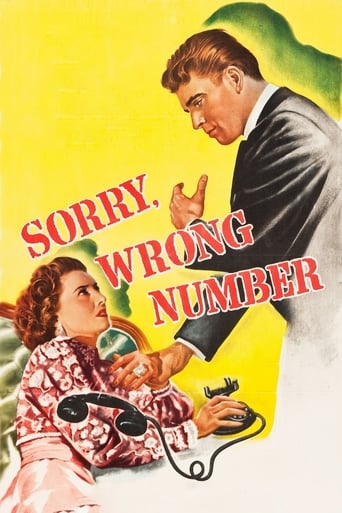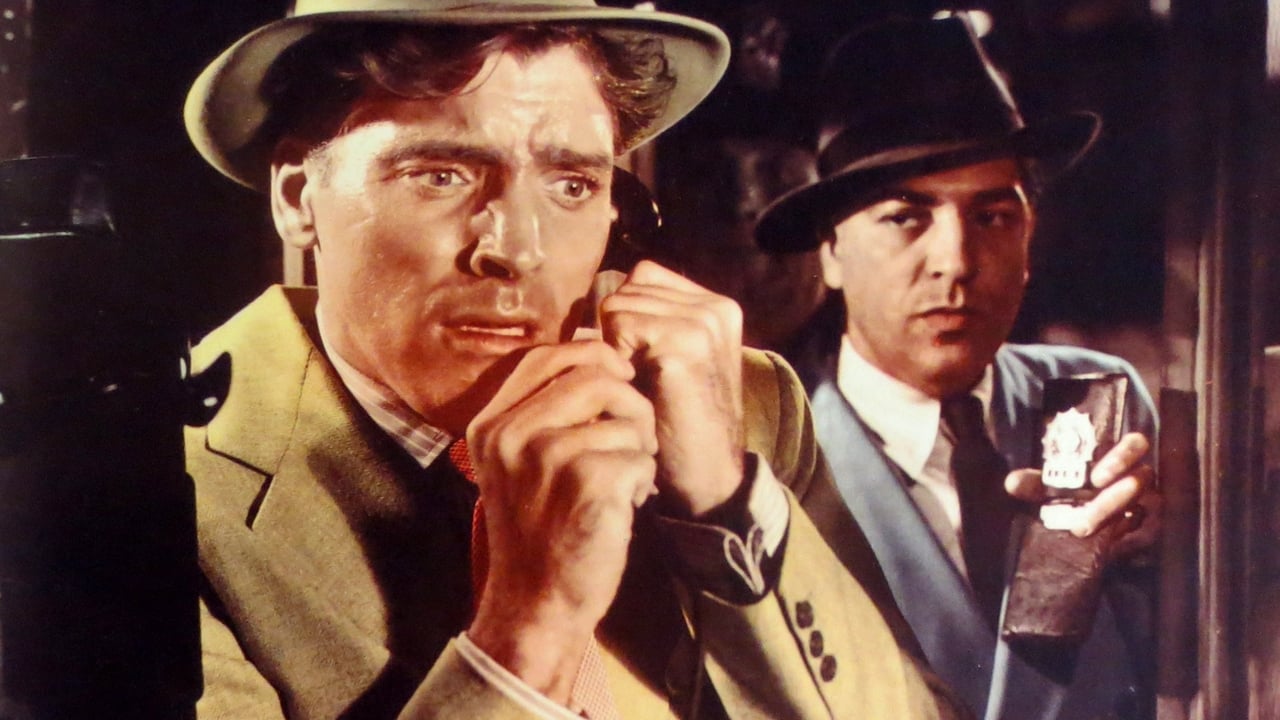clanciai
This is one of the most brilliant noirs ever made. It's like a mosaic, starting from nowhere, introducing an intriguing mystery, and then piece by piece building up into an intricate but perfect drama in overwhelming impressiveness for its vast web of logic forcing many lives into a tragedy. By accident, Barbara overhears a planned murder on the phone, she is bedridden and can't leave the room, she never leaves it all through the film although she tries to and her husband commands her to, but she is an invalid and helpless, especially as she happens to be alone in the house - her expected husband never comes home. They never communicate in the film except in the final stage, when he reaches her on the phone.Barbara Stanwyck's acting is among her very best, it's almost confined entirely to her increasingly desperate telephone calls and conversations, as she gradually gets more and more into the picture of what is going on, but the main intrigue is entirely her own fault. As a rich daughter she married Burt to keep him chained in her dependence, and naturally he can't be happy with that in the long run but must try alternatives and finds a controversial one, a dangerous business adventure, which goes off all right but naturally runs into trouble, and perhaps the most interesting detail of the film is the case of Waldo Evans, a chemist employed at her father's great enterprise who dreams of settling down in England with horses.What heightens the tension and quality of suspense in the film is very much the camera work, as it constantly moves about, catching details of different homes, it frequently wanders about Barbara's room focusing on significant details, also Mr. Evans' apartment is investigated, and it is as if it went investigating on its own, wondering who is interested in the house, going out on the balcony without her, seeking out the darkness of closets and other hidden possibilities - it's perhaps Anatole Litvak's most masterful output, it has been called better than Hitchcock. Franz Waxman's excellent music does its bit too but stays in the shadow of the plot. The final phone call is devastating, we never see the voice, but the tragedy is complete with a number of victims, the sight and end of which we are mercifully spared, but the more we must think of them afterwards - no one gets out of this alive.
SnoopyStyle
Bedridden New York cough-drop heiress Leona Stevenson (Barbara Stanwyck) calls her husband Henry (Burt Lancaster)'s office. The lines get crossed. She listens to a mystery man confirming with George on a plan to murder a woman that night at 11:15. In flashbacks, Leona stole Henry from sweet Sally Hunt. They get married despite her successful drugstore chain owner father's objection. Sally Hunt is now married to a lawyer from the D.A. office. She tells Leona about her husband's mysterious investigation and possible connection to Henry.This is classic noir. Barbara Stanwyck is terrific in her posh room. I would be perfectly happy with less flashbacks and more of her in that room. The shadows and darkness outside give a claustrophobic sense of the situation. I'm not sure why Sally Hunt is trying to help Leona who was so cruel to her. Again, I would like less explanations except for that great Staten Island location. This has a lot of similarities with my favorite psychological thriller of all times Rear Window. Great noir!
tieman64
This is a brief review of "Decision Before Dawn", "Sorry, Wrong Number" and "The Long Night", three films by director Anatole Litvak.Born in the Ukraine, Litvak's career as a film-maker took him from Russia to Germany to France and eventually to Hollywood, where he became a contract director for Warner Bros. He directed "Decision Before Dawn, regarded as one of his finest pictures, in 1951. It tells the tale of Happy (Oskar Werner), a German soldier who, in 1944, defects and becomes an Ally double agent. At the command of American Colonel Devlin (Gary Merrill), Happy embarks on a mission deep behind German lines."Decision Before Dawn" was one of many Hollywood films released in the 1950s which attempted to rehabilitate Germans as "now our allies". Like the similarly themed "The Big Lift" (1950), it boasts superb location photography, Litvak filming in actual cities still scarred by war and still littered will real WW2 machinery. Whilst the film's promises of complexity are eventually betrayed, Litvak's establishing shots, handling of spaces and architecture, his grand outdoor vistas and a beautifully dour performance by Oskar Werner, elevate things tremendously. Werner would milk similar material in Martin Ritt's 1963 masterpiece, "The Spy Who Came in From the Cold". Today, "Decision Before Dawn" plays like a rebuke to Litvak's own "Confessions of a Nazi Spy" (1939), one of the first blatantly anti-Nazi films.Released in 1947, and a remake of Marcel Carne's superior "Le Jour Se Leve", Litvak's "The Long Night" stars Henry Fonda as Joe Adams, a man who blockades himself in an apartment following the murder of Maximillian the Great (Vincent Price), a nightclub magician. Via flashbacks we delve into the circumstances which led to this crime.Typical of Litvak, "The Long Night" boasts audacious camera work. Litvak's whip-pans, cranes, clever forced perspectives and snaking cameras were novel for the era, and his locations drip with atmosphere. While beautiful in a clinical way, Litvak's visuals still can't match Carne's poetic realism and the gauzy romantic humanism which made "Le Jour Se Leve" so famous. Litvak's film – noirish and brooding – also ends on a note of optimism, a reversal of the Carne's more downbeat ending. The film was a financial flop.Litvak released "Sorry, Wrong Number" (1948) a year later. A precursor to high-concept, modern thrillers, "Number" stars Barbara Stanwyck as Leona, a crippled woman who overhears a murder plot on her telephone. From her bedroom – the film's base of operations – Litvak's camera embarks on a dizzying quest to avert the crime, dipping into the past, different locations, through telephone lines and back out again."Sorry, Wrong Number" was based on a Lucille Fletcher radio play, which Litvak's aesthetic attempts to break free from. He glides from New York suites to State Island beaches to Manhattan skylines, but the film's print-oriented origins are hard to escape. Interestingly, Stanwyck's character is revealed to suffer from psychosomatic issues, and it is her very own flights-of-fancy, her constricting nature (epitomised by her crippled legs) which results in the film's central crime. Leona smothers her lover (Burt Lancaster), wants to make him as immobile as she is, a fact which pushes him into criminality. Throughout the film, Leona's stationariness is thus contrasted with the film's countless telephones and telephone wires, devices which seem to enable and amplify Leona's neuroses. Rather than connecting her to the outside world, these wires alienate Leona further, wrapping her up in paranoia and further illusions of control. Litvak followed "Number" up with "The Snake Pit", "Wrong Number's" thematic mirror image.7.5/10 – Worth one viewing. See "Young Man With a Horn" (1950).
James Hitchcock
Leona Stevenson, a wealthy heiress, travels from her home in Chicago to New York to obtain medical treatment for the heart condition which has left her a bedridden invalid. She is obliged to remain in bed with the telephone as her only link to the outside world. One evening, she gets a crossed phone connection and accidentally overhears a conversation between two men who seem to be plotting a murder. This film is sometimes described as having been shot in real time, but it is very different from, say, Hitchcock's "Rope", also made in 1948. "Rope" has a simple structure, observing the classical unities of time, place and action; the action not only takes place in real time but also takes place in a single location and tells a single story, with no subplots and no flashbacks. In "Sorry, Wrong Number" the main plot line, taking place in Leona's bedroom, may take place in real time, but there are also numerous flashbacks. These all occur in the context of a telephone conversation between Leona and some other person, and they relate what has happened in the past or what is happening in some other place. One such flashback, for example, tells the story of how Leona met and married her husband Henry, whom she seduced away from her college friend Sally. For a film which lasts for less than an hour and a half, the plot is a fairly complex one; in its complexity and its use of flashbacks it reminded me of another American drama from the late forties, John Brahm's "The Locket". Much of the drama surrounds Henry, an uneducated but ambitious young man from a working-class background. After his marriage to Leona, he was made a vice-president of the company controlled by her wealthy father. He soon realised, however, that this job was little more than a sinecure, and his marriage to the spoiled, demanding Leona quickly went sour, especially after her illness left her an invalid. Bored and restless, he concocted a dishonest scheme to siphon off money from the company, a scheme which led to his becoming dangerously involved with a ruthless organised crime gang. Some have complained that Burt Lancaster is miscast as Henry, although I suspect that is because they think of him either as the action hero of the fifties or as the socially liberal Hollywood heavyweight of the sixties and seventies. In the early part of his career in the late forties, however, he tended to specialise in crime dramas and film noir, the best-known example probably being his debut film "The Killers". Henry is therefore typical of the sort of role that Lancaster was playing around this time, and his performance is a perfectly good one. One of the problems with the film is the lack of any characters with whom the audience can sympathise. Henry and his associates are obvious villains, and Leona is so spoiled, wilful and hysterical that she forfeits the sympathy we would normally feel for her because of her illness. (It is, in fact, revealed that there is nothing organically wrong with her heart; her symptoms are purely psychosomatic ones arising from her neuroses). Barbara Stanwyck's performance is, technically, a good one- it won her a "Best Actress" Oscar nomination- but I felt that the film could have been improved if Stanwyck had toned things down and tried to make her character more likable. Another weakness arises from the structure of the plot. Because the various flashbacks are related to Leona's various telephone conversations, there are occasions when the people she is speaking to tell her far more information than they would have been likely to do in real life, which occasionally makes the film seem rather unrealistic. Another plot hole comes when Sally's husband Fred, a lawyer with the DA's office, has a sensitive and confidential conversation with a colleague from his own home telephone in the full hearing of his wife. It struck me as highly unlikely that he would have done this, especially as the conversation concerned his wife's ex-boyfriend Henry, who is under investigation by the police. Nevertheless, director Anatole Litvak handles his material well, making use of typical film noir conventions such as low-level lighting, looming shadows and circling camera shots, as well as a spooky musical score (even if this occasionally becomes a bit too intrusive). The final scene, after Leona has come to realise that the murder she has overheard being discussed is her own, is unbearably tense. Overall, "Sorry, Wrong Number" is a very effective piece of suspense, reminiscent of some of Hitchcock's works. 7/10



 AD
AD






